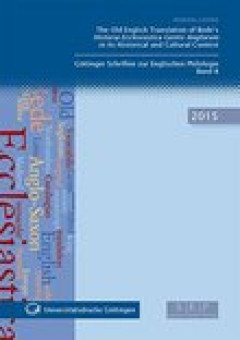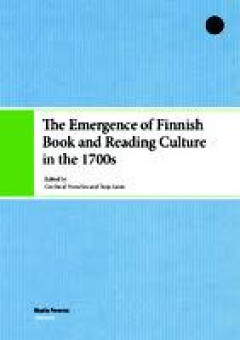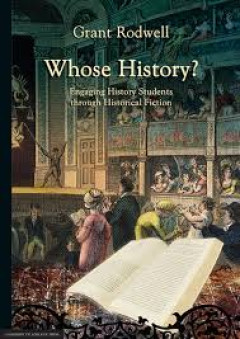Ditapis dengan

Virtue Ethics and Education from Late Antiquity to the Eighteenth Century
This book argues that premodern societies were characterized by the quest for “virtue.” The concept of virtue, complicated and much fought-over, permeated society, encouraging wisdom, courage, and justice, while simultaneously legitimizing social hierarchies based on sex and nationality. By examining pedagogical texts, rituals, performances, and images, this book illuminates the evolution o…
- Edisi
- -
- ISBN/ISSN
- 9789048535101
- Deskripsi Fisik
- 374 p.; 22 cm.
- Judul Seri
- -
- No. Panggil
- 307.72 VIR v

Shaping natural history and settler society :Mary Elizabeth Barber and the ni…
This book explores the life and work of Mary Elizabeth Barber, a British-born settler scientist who lived in the Cape during the nineteenth century. It provides a lens into a range of subjects within the history of knowledge and science, gender and social history, postcolonial, critical heritage and archival studies. The book examines the international importance of a marginalized scientist, th…
- Edisi
- -
- ISBN/ISSN
- 9783030226398
- Deskripsi Fisik
- xxiv, 360p. : ill.
- Judul Seri
- -
- No. Panggil
- 968.703092 HAM s

The Heritage of Arung Palakka:a history of South Sulawesi (Celebes) in the se…
A History of South Sulawesi in the seventeeth century
- Edisi
- -
- ISBN/ISSN
- 9789004287228
- Deskripsi Fisik
- ix, 353 p., [9] p. of plates : maps ; 24 cm.
- Judul Seri
- -
- No. Panggil
- 959.84 AND t

Indic manuscript cultures through the ages. material, textual, and historical…
This collection of essays explores the history of the book in pre-modern South Asia looking at the production, circulation, fruition and preservation of manuscripts in different areas and across time. Edited by the team of the Cambridge-based Sanskrit Manuscripts Project and including contributions of the researchers who collaborated with it, it covers a wide range of topics related to South As…
- Edisi
- -
- ISBN/ISSN
- 9783110543100
- Deskripsi Fisik
- xviii, 783 p.; 22 cm.
- Judul Seri
- -
- No. Panggil
- 091 IND i

Anti-vivisection and the profession of medicine in Britain :a social history
This book explores the social history of the anti-vivisection movement in Britain from its nineteenth-century beginnings until the 1960s. It discusses the ethical principles that inspired the movement and the socio-political background that explains its rise and fall. Opposition to vivisection began when medical practitioners complained it was contrary to the compassionate ethos of their profes…
- Edisi
- -
- ISBN/ISSN
- 9781137556974
- Deskripsi Fisik
- xxi, 217p. : ill.
- Judul Seri
- -
- No. Panggil
- 179.4 BAT a

Sergei M. Eisenstein:notes for a general history of cinema
One of the iconic figures of the twentieth-century cinema, Sergei Eisenstein is best known as the director of The Battleship Potemkin, Alexander Nevskii and Ivan the Terrible. His craft as director and film editor left a distinct mark on such key figures of the Western cinema as Nicolas Roeg, Francis Ford Coppola, Sam Peckinpah and Akiro Kurosawa.This comprehensive volume of Eisenstein’s writ…
- Edisi
- -
- ISBN/ISSN
- 9789089648440
- Deskripsi Fisik
- -
- Judul Seri
- -
- No. Panggil
- 791.430233092 SER s

The Old English translation of Bede's Historia Ecclesiastica Gentis Anglorum …
Did King Alfred the Great commission the Old English translation of Bede’s Historia Ecclesiastica Gentis Anglorum, probably the masterpiece of medieval Anglo-Latin Literature, as part of his famous program of translation to educate the Anglo-Saxons? Was the Old English Historia, by any chance, a political and religious manifesto for the emerging ‘Kingdom of the Anglo-Saxons’? Do we deal w…
- Edisi
- -
- ISBN/ISSN
- 978386395189
- Deskripsi Fisik
- 411 p.
- Judul Seri
- -
- No. Panggil
- 274.2 LEM o

Gender, reading, and truth in the twelfth century
Female Spirituality; Courtly Romance; Use of images; Fiction; Exegesis; Vernacular Literature; Chrétien de Troyes; Wolfram von Eschenbach
- Edisi
- -
- ISBN/ISSN
- 9781641893787
- Deskripsi Fisik
- XII, 419 p.
- Judul Seri
- -
- No. Panggil
- 809.393581 POW g

Genealogy, archive, image :interpreting dynastic history in western India, c.…
The ethnographic approach to Indian history and genealogy; the making of dynastic history in the kingdom of Jhalavad; the history of Gujarat. ‘Genealogy, Archive, Image’ addresses the ways in which history and tradition are ‘reinvented’ through text, memory and painting. It examines the making of dynastic history in the kingdom of Jhalavad, situated in Gujarat, western India, over th…
- Edisi
- -
- ISBN/ISSN
- 9783110539455
- Deskripsi Fisik
- XVI, 278 p.
- Judul Seri
- -
- No. Panggil
- 954.75 JHA, g

Material culture in modern diplomacy from the 15th to the 20th century
The present volume aims at outlining a new field of research with regard to the history of diplomacy: the material culture of diplomatic interaction in early modern and modern times. The material culture of diplomacy includes all practices in foreign policy communication in which single artifacts, samples of artifacts, or else the whole material setting of diplomatic interaction is supposed to …
- Edisi
- -
- ISBN/ISSN
- 9783110463217
- Deskripsi Fisik
- VI, 176 p.
- Judul Seri
- -
- No. Panggil
- 327.20903 MAT m

Introduction to old Javanese language and literature :a kawi prose anthology
The oldest and most extensive written language of Southeast Asia is Old Javanese, or Kawi. It is the oldest language in terms of written records, and the most extensive in the number and variety of its texts. Javanese literature has taken many forms. At various times, prose stories, sung poetry or other metrical types, chronicles, scientific, legal, and philosophical treatises, prayers, chants,…
- Edisi
- -
- ISBN/ISSN
- 9780472902187
- Deskripsi Fisik
- XII, 151 p.
- Judul Seri
- -
- No. Panggil
- 499.222 ZUR i

The emergence of Finnish book and reading culture in the 1700s
Book culture has emerged as an extremely dynamic and border-crossing field of research, internationally and in Finland. The editors and most of the writers of this book were members of the organizing and program committees of the 18th Annual Conference of the Society for the History of Authorship, Reading and Publishing (SHARP), Book Culture from Below, that took place in Helsinki in 2010. This…
- Edisi
- -
- ISBN/ISSN
- 9789522227805
- Deskripsi Fisik
- -
- Judul Seri
- -
- No. Panggil
- 070.9 EME e
How Things Make History:The Roman Empire and its terra sigillata Pottery
Bright red terra sigillata pots dating to the first three centuries CE can be found throughout the Western Roman provinces. The pots' widespread distribution and recognisability make them key evidence in the effort to reconstruct the Roman Empire's economy and society. Drawing on recent ideas in material culture, this book asks a radically new question: what was it about the pots themselves tha…
- Edisi
- -
- ISBN/ISSN
- 9789048529933
- Deskripsi Fisik
- x, 173p.: ill.
- Judul Seri
- -
- No. Panggil
- 938 OYE h

Women in nineteenth-century Russia:lives and culture
- Edisi
- -
- ISBN/ISSN
- 9781906924683
- Deskripsi Fisik
- ix + 249 p.; 22 cm.
- Judul Seri
- -
- No. Panggil
- 305.40947 WEN w
- Edisi
- -
- ISBN/ISSN
- 9781906924683
- Deskripsi Fisik
- ix + 249 p.; 22 cm.
- Judul Seri
- -
- No. Panggil
- 305.40947 WEN w

Whose history?:engaging history students through historical fiction
Whose History? aims to illustrate how historical novels and their related genres may be used as an engaging teacher/learning strategy for student teachers in pre-service teacher education courses. It does not argue all teaching of History curriculum in pre-service units should be based on the use of historical novels as a stimulus, nor does it argue for a particular percentage of the use of his…
- Edisi
- -
- ISBN/ISSN
- 9781922064509
- Deskripsi Fisik
- -
- Judul Seri
- -
- No. Panggil
- 994.00728094 WHO w

Narratives of low countries history and culture
This edited collection explores the ways in which our understanding of the past in Dutch history and culture can be rethought to consider not only how it forms part of the present but how it can relate also to the future. Divided into three parts – the uses of myth and history, the past as illumination of cultural context, and historiography in focus – this book seeks to demonstrate the imp…
- Edisi
- -
- ISBN/ISSN
- 9781910634998
- Deskripsi Fisik
- 250 p.; 22 cm.
- Judul Seri
- -
- No. Panggil
- 900 NAR n

Popular music and public diplomacy :transnational and transdisciplinary persp…
In the early years of the Cold War, Western nations increasingly adopted strategies of public diplomacy involving popular music. While the diplomatic use of popular music was initially limited to such genres as jazz, the second half of the 20th century saw a growing presence of various popular genres in diplomatic contexts, including rock, punk, reggae, and hip-hop. This volume illuminates the…
- Edisi
- -
- ISBN/ISSN
- 9783839443583
- Deskripsi Fisik
- 328 p.
- Judul Seri
- -
- No. Panggil
- 306.4842 POP p

Animals through Chinese history :earliest times to 1911
This volume opens a door into the rich history of animals in China. As environmental historians turn their attention to expanded chronologies of natural change, something new can be said about human history through animals and about the globally diverse cultural and historical dynamics that have led to perceptions of animals as wild or cultures as civilized. This innovative collection of essays…
- Edisi
- -
- ISBN/ISSN
- 9781108551571
- Deskripsi Fisik
- xiii, 277p. : ill.
- Judul Seri
- -
- No. Panggil
- 590.951 ANI a

Musical composition in the context of globalization :new perspectives on musi…
Since the early transformation of European music practice and theory in the cultural centers of Asia, Latin America, and Africa around 1900, music history has to be conceived globally - a challenge that musicology has hardly faced yet. This book discusses the effects of cultural globalization on processes of composition and distribution of art music in the 20th and 21st centuries. Christian Utz…
- Edisi
- -
- ISBN/ISSN
- 9783839450956
- Deskripsi Fisik
- 527 p.
- Judul Seri
- -
- No. Panggil
- 780.905 UTZ m

Authority and authorship in medieval and seventeenth century women's visionar…
In medieval and early modern times, female visionary writers used the mode of prophecy to voice their concerns and ideas, against the backdrop of cultural restrictions and negative stereotypes. In this book, Deborah Frick analyses medieval visionary writings by Julian of Norwich and Margery Kempe in comparison to seventeenth-century visionary writings by authors such as Anna Trapnel, Mary Cary,…
- Edisi
- -
- ISBN/ISSN
- 9783839456897
- Deskripsi Fisik
- 153 p.
- Judul Seri
- -
- No. Panggil
- 421 FRI a
 Karya Umum
Karya Umum  Filsafat
Filsafat  Agama
Agama  Ilmu-ilmu Sosial
Ilmu-ilmu Sosial  Bahasa
Bahasa  Ilmu-ilmu Murni
Ilmu-ilmu Murni  Ilmu-ilmu Terapan
Ilmu-ilmu Terapan  Kesenian, Hiburan, dan Olahraga
Kesenian, Hiburan, dan Olahraga  Kesusastraan
Kesusastraan  Geografi dan Sejarah
Geografi dan Sejarah